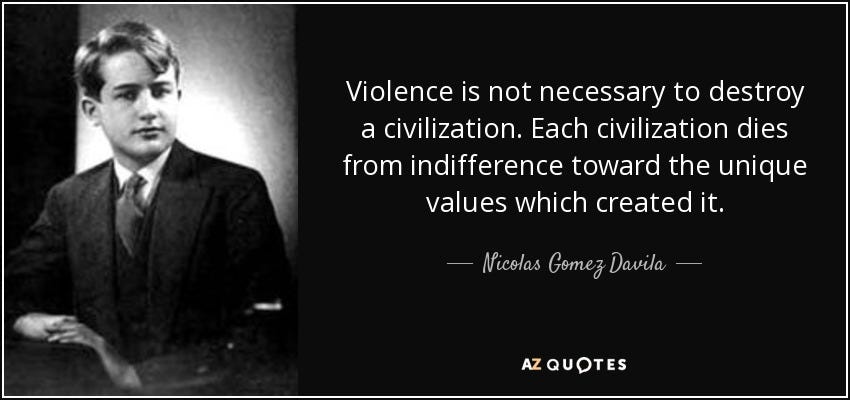Worth reading: Nicolás Gómez Dávila
Recently I stumbled on the works of Nicolás Gómez Dávila through Peter Limberg's substack (worth following if you're not already doing this). It is fitting that one of the most profound thinkers of the 20th century should also have been one of its most obscure. His story and words deeply resonated with me - so - I decided to summarize the points I liked the most here.
Dávila reminds me of the importance of practicing philosophy and engaging in thinking. Also, I first stumbled on the word “reactionary’ through the works of Mary Harrington (reactionary feminism). I think I’ll be using it quite proactively from now on - especially when reading Dávila’s definition of it: A reactionary, rather than a conservative, the Authentic Reactionary understands that adopting a conservative position is only worthwhile in those ages that “maintain something worthy of being conserved.” Unlike the sentimental or romantic conservative, the Authentic Reactionary does not entertain illusions about turning back the clock of history. Rather, he understands that the “temporal adventure between man and that which transcends him” is meant to be experienced in the here and now.
It follows that the Authentic Reactionary also tends toward the cyclical view of history or the belief that the unfolding of history is not, as the Progressive Utopian believes, an inevitable linear development, but an organic process conditioned by nature and subject to the same laws of rise and fall; of birth and decay. As Dávila observes, “The ‘wheel of fortune’ is a better analogy for history than the ‘evolution of humanity.”
That is not to say that the Authentic Reactionary takes no inspiration from the past at all, however. On the contrary, to “reconstruct within himself the civilized universe that is disappearing around him,” the Authentic Reactionary depends upon the distilled wisdom of the voices of the past, with whom he maintains an intimate correspondence. For Dávila, this task is chiefly accomplished through the act of reading. Having accumulated more than 30,000 books throughout his life, Dávila well knew the power of “contact with other souls” and their “strange, hard, sharp thoughts” to stir the spirit from its languid slumbers. Following his belief that “Literary texts are incantatory formulas that transport us to various intellectual climates,” Dávila did not see reading as merely a means to the furtherance of one’s education (though it certainly is that) but rather an essential spiritual exercise:
“Every book we read must leave us richer or poorer, sadder or more happy, safer or more uncertain, but never intact. If, when opening a book, we do not participate in it with disgust or with love, it is better to abandon it until a shadowy need or specific demand awakens in our souls the passion that is illuminated by such a reading. Any book that does not find our secret selves, naked, troubled, and bloody, is a mere temporary refuge.”
“Being a reactionary is not about believing in certain solutions, but about having an acute sense of the complexity of the problems”.
“Relativism is the solution of one who is incapable of putting things in order”.
“Violence is not necessary to destroy a civilization. Each civilization dies from indifference toward the unique values which created it”.
“A noble society disciplines itself without having to wait for catastrophes to force it to be more disciplined.”
“Religious thought does not advance, like scientific thought, but rather deepens.”
“The death of God is an interesting opinion, but it is not one that affects God.”
“Humanity is the only god that is totally false.”
“Ritual is the discreet guardian of spirituality.”
“Finding himself, for modern man, means dissolving himself in a collective identity.”
“Instead of humanizing technology, the modern prefers to technify humanity.”
“The modern world will not be punished. It is the punishment.”
“Modern history is the dialogue between two men: one who believes in God, the other who believes he is god.”
“Education does not cure stupidity; it arms it.”
“Each day we demand more from society so that we can demand less from ourselves.”
“The three hypostases of egoism are: individualism, nationalism, collectivism. The democratic trinity.”
“The tragedy of the Left is to diagnose the malady correctly, but to aggravate it with its therapy.”
“Every straight path leads directly to hell.”
“Hell is a place where man finds all his plans realized.”
“Hierarchies are celestial. In hell all are equal.”
“Our soul has a future. Humanity has none.”
“The soul is degraded when the body is lazy.”
“Everything that can be reduced to a system ends up in the hands of fools.”
“To be a reactionary is to understand that man is a problem without a human solution.”




